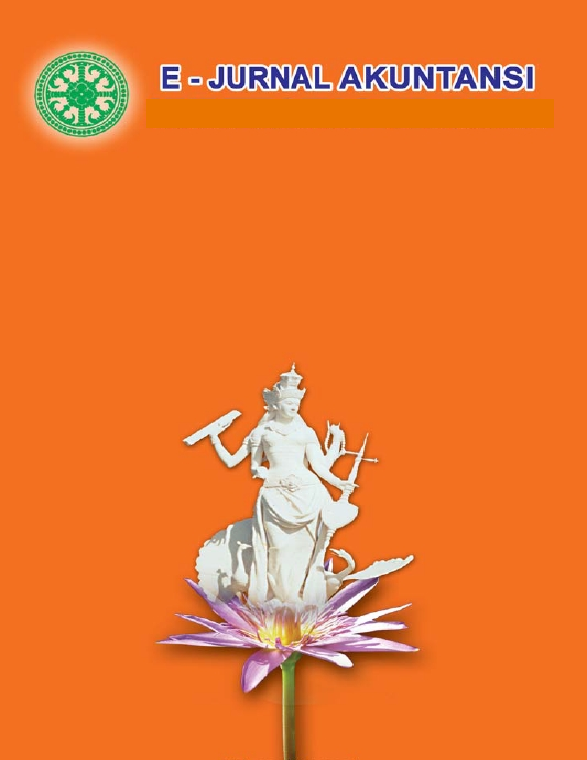Human Capital dan Kinerja UKM: Peranan Praktik Akuntansi Manajemen sebagai Pemediasi
Abstract
This study aims to examine the role of Management Accounting Practice (PAM) as a mediator in the relationship between human capital and SME performance. The study population is SMEs in the province of East Java, the sample technique using convenience sampling method. The data collection method uses e-survey via Whatapss and Line social media because it is the most popular in Indonesia. The data that was collected was 108 SMEs. Hypothesis testing uses partial least squares – structural equation modeling (PLS-SEM). The test results show that human capital has a significant and positive effect on SME performance, PAM has a significant and positive effect on SME performance, and PAM has a role as a partial mediation between PAM and SME performance. The research results have theoretical implications, namely human capital is an antecedent variable that influences the use of PAM and PAM has a role as a partial mediation. Meanwhile, the practical implication is that human capital in the context of SME owners has an important role for the survival of SMEs during a pandemic. And the use of PAM will help SMEs to be able to maintain their viability.
Keywords: Covid-19 pandemic; Human Capital; Management Accounting Practices; SMEs’ Performance
Downloads
References
Ahmad, K. (2017). The implementation of management accounting practice and its relationship with performance in Small and Medium Enterprises sector. International Review of Management and Marketing, 7(1), 342–353.
Ahmad, K., & Zabri, S. M. (2015). Factors explaining the use of management accounting practices in Malaysian medium-sized firms. Journal of Small Business and Enterprise Development, 22(4), 762–781. https://doi.org/10.1108/JSBED-04-2012-0057
Azudin, A., & Mansor, N. (2017). Management accounting practices of SMEs: The impact of organizational DNA, business potential and operational technology. Asia Pacific Management Review, 23(3), 222–226. https://doi.org/10.1016/j.apmrv.2017.07.014
Fernanda, R., & Sagoro, E. M. (2016). Pengaruh kompensasi, kepuasan kerja, motivasi kerja dan gaya kepemimpinan terhadap kinerja karyawan. Jurnal Nominal, V, 15.
Gerdin, J. & J. Greeve. (2004). Form of contingency fit in management accounting research – A critical review. Accounting, Organizations and Society, 29, 303-326
Ghozali, I. & Ratmono, D. (2018). Analisis multivariate dan ekonometrika: teori dan aplikasi dengan EVIEWS 10. Semarang: Universitas Diponegoro, 452 halaman.
Ismanto, H., & Irawan, S. A. W. (2018). Peran karakteristik pemilik, hubungan dengan pelanggan, komitmen perilaku, dan orientasi usaha terhadap kinerja keuangan UKM. Jurnal Siasat Bisnis, 22(1), 76–91. https://doi.org/10.20885/jsb.vol22.iss1.art5
Kaushalya, G. A. T., & Kehelwalatenna, S. (2017). Mediating effect of management accounting practices on the relationship between intellectual capital and firm performance. South East Asia Journal of Contemporary Business, Economics and Law, 14, 1.
Lv, B., & Han, D. (2015). The relationship between intellectual capital and corporate performance in chinese bio-pharmaceutical industry. SHS Web of Conferences, 17(2003), 01024. https://doi.org/10.1051/shsconf/20151701024
Massaro, M., Dumay, J., & Bagnoli, C. (2015). Where there is a will there is a way. Journal of Intellectual Capital, 16(1), 1–5.
Maziriri, E. T., & Mapuranga, M. (2017). The impact of management accounting practices (MAPs) impact on small and medium enterprise business performance within the gauteng province of south africa. Journal of Accounting and Management, 7(2), 12–25. https://doi.org/10.5171/2018.345766
Muda, S., & Rahman, M. R. C. A. (2016). Human capital in SMEs life cycle Perspective. Procedia Economics and Finance, 35(October 2015), 683–689. https://doi.org/10.1016/s2212-5671(16)00084-8
Nakhata, C. (2018). The relationships between human capital, entrepreneurial competencies and career success of SME entrepreneurs in Thailand. AU Journal of Management, 5(1).
Novika, S. (2020). Bedanya dampak pandemi corona ke UMKM dengan krisis 1998. DetikFinance. https://finance.detik.com/berita-ekonomi-bisnis/d-5101911/bedanya-dampak-pandemi-corona-ke-umkm-dengan-krisis-1998
Novas, J. C., Alves, M. do C. G., & Sousa, A. (2017). The role of management accounting systems in the development of intellectual capital. Journal of Intellectual Capital, 18(2), 286–315. https://doi.org/10.1108/JIC-08-2016-0079
Pena, I. (2002). Intellectual capital and business start-up success. Journal of Intellectual Capital, Vol. 4, Iss. 3, 180-198 http://dx.doi.org/10.1108/14691930210424761
Prihastiwi, D. A., & Sholihin, M. (2017). Penggunaan praktik-praktik akuntansi manajemen pada usaha kecil menengah dan faktor-faktor kontinjensinya. Jurnal Akuntansi, 1–34.
Subramaniam, N., Collier, P., Phang, M., & Burke, G. (2011). The effects of perceived business uncertainty, external consultants and risk management on organisational outcomes. Journal of Accounting and Organizational Change, 7(2), 132–157. https://doi.org/10.1108/18325911111139671
Tayles, M., Pike, R. H., & Sofian, S. (2007). Intellectual capital, management accounting practices and corporate performance: Perceptions of managers. Accounting, Auditing and Accountability Journal, 20(4), 522–548. https://doi.org/10.1108/09513570710762575
Toorchi, M., Asiaei, K., & Dehghan, M. (2015). Intellectual capital and management accounting practices: Evidence from Iran. Procedia Economics and Finance, 31, 775–788. https://doi.org/10.1016/s2212-5671(15)01167-3
Zalesna, A. (2012). Intellectual capital and the SME life cycle model: A proposed theoretical link. Proceeding of the 4th European Conference on Intellectual Capital 23-24 April 2012, 489-495. Arcada University of Applied Science, Helsinki, Finland. esearchgate.net/profile/Gina-Hechanova/publication/269637573_A_Study_of_Culture_Dimensions_Organizational_Ambidexterity_and_Perceived_Innovation_in_Teams/links/564131f008ae24cd3e4105b5/A-Study-of-Culture-Dimensions-Organizational-Ambidexterity-and-Perceived-Innovation-in-Teams.pdf#page=507

This work is licensed under a Creative Commons Attribution-ShareAlike 4.0 International License.

















